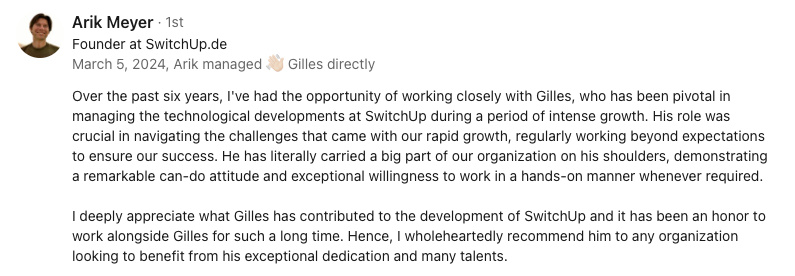Abstract:
The article discusses the advantages of using Kotlin as a programming language for startups aiming for sustainable growth and innovation. Kotlin's modern features, such as clear syntax and null safety, are highlighted for reducing maintenance costs, avoiding technical debt, and improving code reliability. The language's compatibility with Java allows for a seamless transition and gradual integration, which helps maintain system stability and supports EU compliance standards like GDPR. Kotlin's appeal also extends to talent retention, as its modern capabilities attract and satisfy developers, fostering a dynamic work environment and improving hiring outcomes. Real-world examples, such as Monzo's use of Kotlin for Android development, illustrate the language's impact on efficiency and scalability in tech startups. The article underscores the importance of aligning Kotlin adoption with business goals to enhance productivity and innovation, emphasizing the language's role in building a strong technical foundation for startups.
Navigating startup growth can be tricky, and choosing the right programming language is crucial. Kotlin is becoming popular for its modern features and efficiency. It's helping reduce maintenance costs, avoid technical debt, and retain talent. Let's explore how Kotlin can benefit your startup.
Kotlin for Sustainable Growth
Kotlin is a great choice for startups looking to maintain clean and efficient codebases. Its modern features aid in long-term growth and extend beyond Android, supporting cross-platform projects like web development and server-side applications.
Cutting Maintenance Costs
Kotlin's syntax is clear and reduces unnecessary code, making it easier to maintain and less prone to bugs. From my experience working with Kotlin, concise coding can boost project efficiency, allowing teams to focus more on innovation than on debugging. Kotlin's clarity helps in keeping codebases sustainable and flexible.
Kotlin's design encourages safe coding practices, minimizing technical debt. Its null safety feature prevents common coding errors, such as null pointer exceptions. Monzo, a UK digital bank, uses Kotlin to clean up their Android development, simplifying maintenance and reducing costs.
Kotlin supports scalability while minimizing technical debt, making it ideal for startups aiming for growth. By using Kotlin, businesses can scale effectively without messy codebases, laying a solid foundation for future growth.
Avoiding Technical Debt
Kotlin works well with Java, easing the transition and preventing new technical debt. This compatibility allows gradual integration of Kotlin into Java systems, avoiding abrupt changes.
Kotlin's features help maintain safe and reliable code. Experts highlight how its null safety and concise syntax lead to cleaner codebases, supporting quick growth without losing stability. By reducing the need for frequent refactoring, Kotlin keeps the codebase stable, which is attractive to developers and helps in talent retention. Developers prefer working with modern tools that make their jobs easier and more satisfying.
Improving Talent Retention with Modern Tech
Attracting and keeping top talent is crucial for startup success. Kotlin's modern features are a big draw for developers.
Attracting Top Talent
Developers love efficient and innovative languages, and Kotlin stands out. The Stack Overflow Developer Survey shows Kotlin is popular among developers. Startups using Kotlin often attract more skilled professionals who want to work with cutting-edge tech.
In real-world cases, companies using Kotlin report increased interest from developers. Tech startups in Europe find Kotlin helps improve their hiring results, making them more appealing employers.
Tech leaders praise Kotlin for attracting motivated developers. By using Kotlin, businesses create a dynamic work environment that appeals to those passionate about modern tech.
Boosting Employee Satisfaction
Retaining skilled employees is key once you've hired them. Developers enjoy Kotlin's syntax and capabilities, which simplify tasks and increase job satisfaction. Reports show developers value Kotlin for its ease of use and powerful features.
Companies using Kotlin often see improved employee satisfaction. Easier coding leads to less stress and more creative problem-solving. These factors contribute to a happier workforce.
Providing learning opportunities with Kotlin helps retain employees. Working with a modern language offers growth and keeps employees engaged. It fosters a culture of improvement, which benefits both the workforce and the company.
Navigating EU Compliance with Kotlin
Startups need to meet EU regulations like GDPR to build trust. Kotlin helps with this by offering a strong foundation for compliance.
Meeting GDPR Standards
GDPR compliance is crucial for secure applications. Kotlin's null safety helps prevent security issues, aligning with GDPR's focus on data privacy. It's essential for protecting user data from breaches.
Kotlin's compatibility with Java is a big advantage. It allows startups to use existing Java security tools, integrating strong data protection into new projects. This makes navigating EU regulations more manageable.
Real-world use shows Kotlin helps with compliance. Startups using Kotlin and Java frameworks meet data protection standards while staying innovative.
Secure Coding Practices
Secure coding is vital for protecting data and ensuring stability. Kotlin supports immutability, reducing data breach risks and maintaining data integrity. This aligns with EU regulations.
Startups find Kotlin's security features valuable for compliance. They report fewer security issues and better data integrity, crucial for GDPR readiness.
Tech leaders recognize Kotlin's role in efficient compliance. Its clear syntax and security features enhance code quality and developer experience.
Integrating Kotlin into Java Systems
Bringing Kotlin into existing Java systems can boost productivity without disrupting operations.
Using Interoperability
Kotlin's interoperability with Java allows for gradual integration, preserving infrastructure investments while adopting new features. This prevents operational disruptions during language transitions.
Transition Strategies
- Start small with less critical projects to get familiar with Kotlin before moving to bigger components.
- Use Kotlin for new features while keeping Java for core functions. This dual approach enhances productivity without risking system stability.
Success Stories
Many tech companies report increased efficiency with Kotlin. A Berlin-based company migrated to Kotlin, resulting in cleaner code and faster development. These examples show Kotlin's benefits in maintaining code and reducing debugging time.
Tools and Practices for Transition
Using the right tools and best practices ensures a smooth transition from Java to Kotlin.
- Tool Support: Tools like IntelliJ IDEA or Android Studio support Kotlin development and Java interoperation, simplifying the transition.
- Code Style Guide: A unified code style guide helps maintain consistency across Kotlin and Java. Tools like ktlint enforce conventions, making collaboration easier.
- Testing and Monitoring: Thorough testing and monitoring catch issues early, helping maintain system reliability during the transition.
Startups Thriving with Kotlin
Kotlin helps startups grow through efficient coding practices. Let's look at how leading startups use Kotlin to reach their goals.
Lessons from Startups
Monzo, a UK digital bank, uses Kotlin for Android projects, improving code maintenance and developer efficiency. Kotlin reduces boilerplate, streamlining processes for growth and innovation.
Fintech companies find Kotlin improves maintainability and scalability, reducing bugs and enhancing reliability.
Best Practices and Takeaways
Align Kotlin adoption with business goals for maximum benefit. This boosts team productivity and product quality, allowing startups to focus on innovation.
Keep innovating with Kotlin to stay competitive. Integrating new features ensures startups stay ahead and maintain a strong technical foundation.













